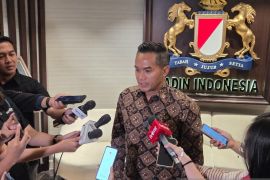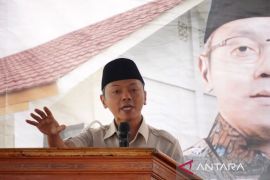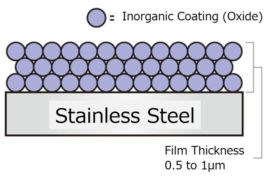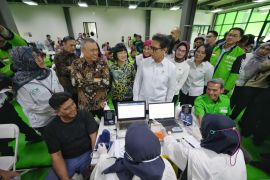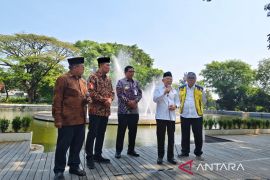Under the Fukuda Doctrine, Kartasasmita noted that Japan had contributed significantly to the human resources development in Indonesia.Jakarta (ANTARA News) - The economic cooperation between Indonesia and Japan has been well-established and in full bloom, since the opening of diplomatic relations between the two countries in 1958.
This was due to the complementarity between Japans endeavors for economic reconstruction and its growing need for natural resources and energy.
Indonesias drives for economic development, which required capital and technology, had been powerful enough not only to sustain the link but also to expand and further deepen it.
By 1980, Japan had already become Indonesias biggest economic partner.
Nevertheless, the success story came with a price, which was considered significantly high.
Along the progressive Indonesia-Japan collaboration journey, Indonesia had also experienced significant hitches and even serious incidents, such as Malari in January 1975 during then prime minister Tanakas visit.
These incidents posed problems for both countries but provided valuable lessons to be learnt.
Indonesia made serious efforts to ensure a more balanced treatment of the development trilogy.
More attention was then paid to political stability and social equity instead of focusing on economic growth.
Japan, which also experienced similar reaction in some other ASEAN countries, did learn the hard lesson as well.
Three years after Malari, in August 1978, Prime Minister Fukuda Takeo made his historic speech, setting out Japans Asia policy, especially toward ASEAN, which was hitherto known as the Fukuda Doctrine.
The implementation of the Fukuda Doctrine, launched in Manila on Aug 10, 1977, has brought about changes in the characteristics of Indonesias economic cooperation with Japan, Chairman for Indonesia-Japan Friendship Association, Ginandjar Kartasasmita, stated.
In essence, the doctrine had three basic ingredients. The first was to restore confidence in Southeast Asia on Japans commitment to peace and refusal of military power.
The second was to promise Japans efforts to further create mutual confidence and trust with the nations of Southeast Asia on the basis of heart-to-heart understanding. The third was Japans commitment to cooperation with ASEAN as a group and as an institution.
The earlier characteristics of dependent economic cooperation were gradually transformed into interdependence.
Economic cooperation was enlarged to cover other aspects such as education, health, and other social sectors.
Under the Fukuda Doctrine, Kartasasmita noted that Japan had contributed significantly to the human resources development in Indonesia.
"In the education sector, Japan constructed 600 schools in 12 provinces nationwide. Japan also contributed to the development of vocational training in 153 vocational training centers nationwide," he noted.
In addition to these, Japan assisted the medical faculties in all major universities, such as the Faculty of Medicine and Health Science of Syarif Hidayatullah, State Islamic University in Jakarta.
Apart from being an understanding partner in development, Indonesia sees Japan as a model for its economic development.
"Japans success in transforming itself from a rice-based economy into one of the worlds economic and industrial superpower is an inspiration for Indonesias economic development strategy," he revealed.
Kartasasmita remarked that the cooperation between Indonesia and Japan should be established at a higher level of human resources, technology input, and value-added chain.
"We must be able to see Indonesia enter a new phase of development to create a knowledge-based, innovative, and creative economy," he revealed.
He remarked that the Indonesian people should look into the next stage of Indonesia-Japan cooperation.
Instead of aid, the emphasis should be on equitable and fair trade, both in goods and services.
It cannot rely anymore on the exploitation of raw natural resources and cheap labor.
The Indonesian economy should be more competitive, both in the domestic and global market, to provide jobs, alleviate poverty, and avoid the middle-income trap.
"We cannot depend forever on the domestic market for the sustainability of our medium- and long-term economic objectives," he pointed out.
Indonesia should encourage more investment from Japan. By investing in Indonesia, Japan can immediately benefit from its large domestic market and abundant labor to enter other markets in the region more competitively, namely the ASEAN markets.
Evaluation
Head of International Relations Department of Bina Nusantara University, Tirta N. Mursitama, remarked that both countries should pay serious attention to conduct the evaluation of Indonesia Japan Economic Partnership (IJEPA).
Although it has been valid for almost 10 years, the implementation of IJEPA is still problematic.
Reports from relevant ministries, such as the Ministry of Industry, reveal that the Indonesian side is affected across sectors in the first five years.
For example, Indonesia still imports more from Japan than it exports to Japan.
One study concludes that Indonesias exports increased 5.23 percent per year, while Japanese exports only experienced a very small increase of 0.46 percent per year.
However, Mursitama noted that the heart of IJEPA lies in strengthening the competitiveness of national industries through the Manufacturing Industrial Development Center (MIDEC).
From a review conducted by the Ministry of Industry, MIDEC has not been effective yet.
Out of a total of 13 sectors, consisting of 6 cross-sectors and 7 specific sectors, only 5 were running well. These sectors were three in the cross sectors, such as welding, molding, and metal cutting, as well as energy conservation; while the other two were electronics and automotive, which include specific sectors.
Therefore, the MIDEC, enacted in 2008-2013, has not resulted in significant capacity building achievements. To that end, the Ministry of Industry has proposed an improvement in manufacturing infrastructure, which has never been fulfilled by Japan despite being listed in IJEPA.
In addition to the above-mentioned technical factors that are illustrative in nature, from the point of view of business diplomacy, IJEPA has failed to compete with various economic institutional arrangements such as ASEAN-China Free Trade Agreement (ACFTA) in Southeast Asia and its impact.
Not to mention, this is especially truewhen faced with the policy of China, which lately has more incentives to offer and penetrate its ideas of the One Belt One Road (OBOR)-now turned to Belt Road Initiative (BRI) and Regional Comprehensive Economic Partnership (RCEP) at the global level.
Searching for New Venues
Professor Tirta N. Mursitama remarked that the Fukuda doctrine is still relevant nowadays. The challenge is to create an innovative way and a breakthrough of business diplomacy between two countries.
The key word is the success of building relationships with Indonesia, which is very close to China and still influential in ASEAN.
"The choice is now in Japans hand. The question is that whether Japan will deliver its promises in IJEPA. First, there is no other way than to develop Indonesias industrial and technological capabilities to offset Chinas vigorous expansion. It has become a norm and necessity that Japan and Indonesia should work together to ensure the transfer technology between two countries," Mursitama pointed out.
Japan would have to transfer the technology, enabling Indonesia to seize it by increasing its absorptive capacity, and prepare a national innovation system by increasing the research and development of industry and government more significantly.
Secondly, Japan should change its diplomatic style by making use of Japanese alumni who serve in the government, industry, epistemic communities in universities, think-tanks, as well as community groups more effectively.
Thirdly, Japan should open more ways to include local government in sub-national level to enhance business activities through both micro-regionalization and micro-regionalism.
Those two integration processes will compliment the efforts to integrate ASEAN as Economic Community (AEC).
At the end of the day, it will make AEC more relevant to people, specifically in the cross-border areas.
Finally, by fulfilling these three ideas, Indonesia-Japan relations can lead to more mutual benefits.(*)
Reporter: Azis Kurmala
Editor: Heru Purwanto
Copyright © ANTARA 2017
